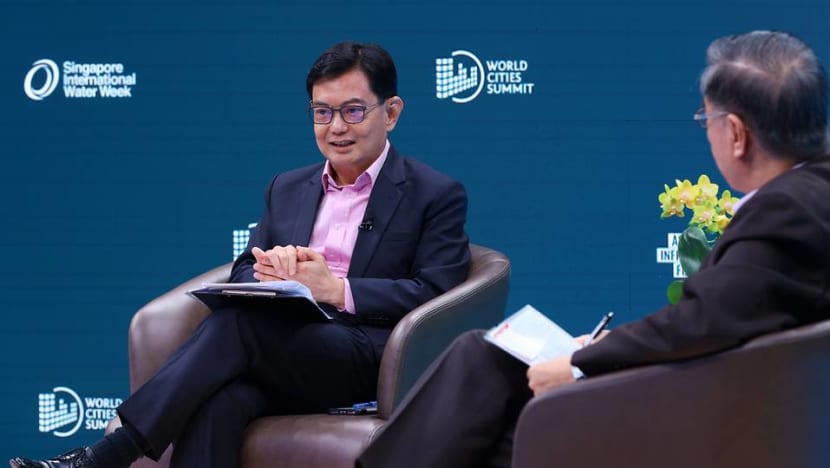Investing in future, ensuring trust in authorities are key to recovery after disruptive event such as COVID-19: DPM Heng

Deputy Prime Minister Heng Swee Keat speaking at the World Cities Summit on Jun 21, 2021. (Photo: Ministry of Communications and Information)
SINGAPORE: Investing in the future and ensuring trust in authoritative sources of information are some key strategies that will speed up recovery after a disruptive event, such as the COVID-19 pandemic, said Deputy Prime Minister Heng Swee Keat on Monday (Jun 21).
Mr Heng was speaking at the World Cities Summit in response to a question by a member of the audience on what strategies cities could adopt to hasten recovery after a disruption, based on Singapore’s experience.
Mr Heng acknowledged that more disruption must be expected as the world becomes more integrated and interdependent.
The first step, he said, is to treat each event as a "different crisis", adding that although they "may look the same", the causes and solutions for each will differ.
“Being clear that each one is different, so that we don't end up fighting the last war and deploying the wrong tools for doing that,” he said.
It is also important to learn from past crises, said Mr Heng, referencing Singapore’s decision to build the National Centre for Infectious Diseases (NCID) following the Severe Acute Respiratory Syndrome (SARS) crisis of 2003.
READ: IN FOCUS: Tackling COVID-19 with targeted measures - the new normal for Singapore?
The COVID-19 pandemic has emphasised the need to be resilient to future pandemics, which are bound to occur again at some point, he said.
Mr Heng added: “Out of that learning must translate into action, and the action must be to invest in our future. After such a major crisis, to assume that the future is just like the good old days will be totally unrealistic and I would say, irresponsible.
“We'll have to think about: ‘What does the future mean for individuals, for communities, for businesses of various shapes and sizes?’”
In addition, it is important to ensure that people are well-informed and that there is "a level of trust" in society in the authorities.
“If good, credible science-based evidence is ignored, you can't do anything about it. And therefore, how do we advance the knowledge of people in that area? And how do we deepen the trust that our people have authoritative sources of information?" said Mr Heng.
"Even during this pandemic, you see the amount of false information that is spread on the Internet, whether it's about the virus, the origin of the virus ... the vaccines are better, the vaccines will do you more harm and so on.
“I'm all for good scientific debate … but it is dangerous when people exploit social media to purvey their own misguided views and hope to turn it into some political advantage.”
READ: 6 in 10 people in Singapore have received fake COVID-19 news, likely on social media: Survey
Social media companies must "take responsibility for their business", said Mr Heng.
"Because for us to just argue that: ‘No, I'm just a neutral platform and anybody can put information and this is the freedom of speech ... we have seen how many social media companies have been under a lot of pressure, especially last year during the US election for them to have to respond, to take down blatantly false facts and allegations.
"So I think it's important for us to maintain trust in the information, especially in a pandemic like this, where good, accurate information is quite critical to the response – not just of you and I, but really of everyone in the world."
FACTORS FOR RESILIENCE
The audience was also polled on what they believed to be the most critical factors in helping a city be more resilient and sustainable: Public support, political will, financial and technological resources, as well as regional and international collaboration.
Mr Heng said all four factors were "highly correlated", and "fully agreed" with the majority of audience members that public support is the most important factor.
“If you have public support, that will be very helpful with the whole-of-society approach, because none of these problems can be solved in isolation," added the Deputy Prime Minister.
Mr Heng said that public support also translates into political will, as politicians have to respond to it, although there is a difference between how governments around the world respond to this.
He acknowledged that financial resources are also important in helping projects get off the ground, while technological resources are key to future solutions.
READ: Learn lessons from COVID-19, invest in technology to prepare for 'Disease X': DPM Heng
PLANNING FOR THE NEW NORMAL
When asked about what the next generation of leaders will have to plan for in a new normal, Mr Heng said: “I have a simple answer to that … Whatever we plan, focus on what people need.
“What do we need to learn, work, play, interact with other people, to connect with people?"
He added that cities will become "more important". Building resilient and sustainable cities cannot be done alone.
“If we can bring together a partnership within our society, and with people around the world, we can build our new normal," said Mr Heng.
BOOKMARK THIS: Our comprehensive coverage of the COVID-19 pandemic and its developments
Download our app or subscribe to our Telegram channel for the latest updates on the coronavirus outbreak: https://cna.asia/telegram












